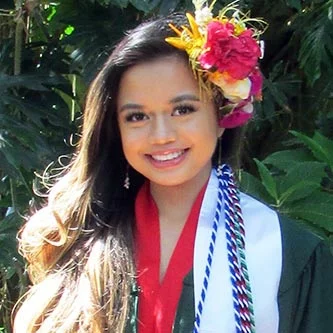Graduate Certificate in Conflict Resolution (GCCR)
The Graduate Certificate in Conflict Resolution (GCCR) is designed to equip students with practical skills in negotiation, facilitation, and mediation – essential competencies for addressing today’s complex and dynamic challenges. With a strong emphasis on community building and collaborative problem-solving, this certificate supports both graduate study and professional development across various fields, including public administration, business, law, education, social work, urban planning, and human resource management.
Students learn techniques for resolving conflicts, mediating disputes, and negotiating effectively – skills developed through simulations and firsthand experiences that extend beyond the classroom.
Please note this is a certificate program, not a degree program.
Learn more about the Matsunaga Institute for Peace.

What was your fondest memory at the Matsunaga Institute?
During my facilitation class (PACE 668 “Facilitating Community and Organizational Change”), our final assignment/project as a class was to facilitate a summit for Malāma Mānoa. Each group was responsible for a specific part of the meeting. Therefore, our whole class got to work together to lead a meeting of about 100 people, and I believe it turned out amazing at the end. It was a wonderful learning experience that I was glad to be a part of!
Justine Kuna Sison, 2022
MA in Communication (In Progress); Graduate Certificate in Conflict Resolution
Additional Details
The GCCR requires the completion of 15 credits, including:
A Foundational Course in Negotiation, either:
- PACE 629/PLAN 629: Negotiation & Conflict Resolution *
- LAW 508: Negotiation and Alternative Dispute Resolution (2 credits)
- MGT 660: Negotiation
A Culminating Project, either;
- PACE 695: Conflict Resolution Practicum (Practicum Planning Guide)*, or a
- PACE 699: Directed Reading and Research (Capstone Paper Guidelines) *
Approved Electives
- PACE 621/PLAN 621: Environmental Conflict Resolution *
- PACE 637/WS 647/ LAW 547: Gender: Law and Conflicts
- PACE 647: Mediation: Theory and Practice *
- PACE 650: Dispute Resolution System Design
- PACE 652/EDEA 652: Conflict Management for Educators *
- PACE 660: Family Mediation
- PACE 661/PLAN 661: Collaboration Between Sectors
- PACE 668/PLAN 668: Facilitating Community and Organizational Change
- PACE 690: Topics: Conflict Theory
- PACE 790: Advanced Topics: Conflict Theory
- PLAN 627: Negotiation & Mediation in Planning
- POLS 633: International Conflict Resolution
- POLS 634: Teaching Model United Nations (1 credit)
- POLS 635E: International Organization
- LAW 590M: Mediation Clinic (2 credits)
Additional Courses (maximum of two, permission required)
- PACE 420: Introduction to Human Rights *
- PACE 429: Negotiation *
- PACE 447: Introduction to Mediation *
- PACE 468: Introduction to Facilitating Organizational Change *
- PACE 477: Culture and Conflict Resolution *
- PACE 478: International Law and Disputes *
- PACE 480: Managing Human Conflict *
- COMG 455: Conflict Management *
Notes
- Successful completion of the 15-credit GCCR requires a grade point average of 3.0 in courses taken for a letter grade.
- Every course counted towards the GCCR must be taken for a letter grade unless the course is only offered on a Credit/No Credit basis.
* Distance learning (online) is available.
Interested students should carefully review and satisfy the following:
Deadlines
- March 31 for Fall admission
- October 31 for Spring admission
Applications received after these dates will be considered case-by-case as space allows. Rolling admissions are available.
Application Process
Prospective GCCR students, including unclassified students and those earning the certificate concurrently with another graduate degree, must complete the online application as provided by Graduate Division. The following documents are required and should be submitted via the Program Materials section of the online application:
- CV / resumé
- A statement of objectives that describes:
- Why you are interested in the GCCR; include your conflict resolution experience and/or goals for participating in the program, and
- Your long-term goals, both personal and professional
- Solicit a letter of recommendation from a professional reference or a faculty member or academic department head familiar with your record.
There is an application fee. GRE exams are not required.
Eligibility
To be eligible for admission, an applicant must hold or expect to hold prior to matriculation a bachelor’s degree from a regionally accredited U.S. college or university, or an equivalent degree from a recognized non-U.S. institution of higher education.
- At minimum, the applicant needs to demonstrate above average academic performance (B average, usually a 3.0 on a 1.0-4.0 scale) for undergraduate coursework and for any post-baccalaureate or graduate coursework.
- All applicants must meet Graduate Division admissions standards and documentation requirements.
- TOEFL is required of applicants who are non-native speakers of English.
- The minimum scores are 600/100 (paper/internet)
- Official TOEFL scores must be sent directly to Graduate Division Student Services.
Questions
All questions concerning the application and associated requirements should be directed to Graduate Student Services (gradss@hawaii.edu). Questions about the letter of recommendation or statement of objectives should be directed to the Matsunaga Institute for Peace (uhip@hawaii.edu).